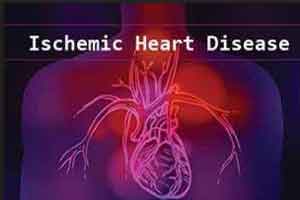- Home
- Editorial
- News
- Practice Guidelines
- Anesthesiology Guidelines
- Cancer Guidelines
- Cardiac Sciences Guidelines
- Critical Care Guidelines
- Dentistry Guidelines
- Dermatology Guidelines
- Diabetes and Endo Guidelines
- Diagnostics Guidelines
- ENT Guidelines
- Featured Practice Guidelines
- Gastroenterology Guidelines
- Geriatrics Guidelines
- Medicine Guidelines
- Nephrology Guidelines
- Neurosciences Guidelines
- Obs and Gynae Guidelines
- Ophthalmology Guidelines
- Orthopaedics Guidelines
- Paediatrics Guidelines
- Psychiatry Guidelines
- Pulmonology Guidelines
- Radiology Guidelines
- Surgery Guidelines
- Urology Guidelines
Rheumatoid Arthritis patients at higher Risk of CAD and Death

Rheumatoid arthritis patients are at higher risk for acute coronary syndromes than the general population and are at higher risk for death after these syndromes, Swedish researchers found. In a Clinical and epidemiological research, Angla Mantel et al. tried to assess long-term outcomes in patients with RA with ACS compared with non-RA patients with ACS, and to investigate whether the use of secondary preventive drugs could explain any differences in ACS outcome and whether they received appropriate cardioprotective secondary pharmacologic treatment after acute coronary syndromes. The study was published in Annals of Rheumatic Diseases.
Studies have shown that patients with rheumatoid arthritis are at high risk for cardiovascular disease and present with ST-elevation myocardial infarction and sudden cardiac death with alarming frequency. Further research has revealed an increase in short-term mortality in patients with rheumatoid arthritis not otherwise explained by comorbidities.
The authors performed a performed a cohort study based on 1135 patients with RA and 3184 non-RA patients who all developed an incident ACS between 2007 and 2010. We assessed 1-year and overall relative risks for ACS recurrence and mortality, as well as prescriptions of standard of care secondary preventive drugs. Final follow-up was at 4 years.
It was found that -
• Of the patients with rheumatoid arthritis, 79.6% were still alive at 90 days after an acute coronary syndrome.
• Of non–rheumatoid arthritis patients, 86.1% were alive at 90 days after an acute coronary syndrome.
• At 365 days after an acute coronary syndrome, 70.7% and 79.6% of rheumatoid arthritis and non–rheumatoid arthritis patients, respectively, were still alive.
• The rate of recurrent acute coronary syndrome was 30% higher in patients who had rheumatoid arthritis than in those who did not (hazard ratio [HR] at 1-year, 1.35; 95% confidence interval [CI], 1.09-1.68; at final follow-up, 1.34; 95% CI, 1.12-1.60). When propensity adjustment was performed, the HRs remained significant (1 year, 1.28, 95% CI, 1.03 to 1.60); complete follow-up, 1.25 (95% CI, 1.05 to 1.50).
• Mortality after acute coronary syndrome for patients with and without rheumatoid arthritis was 30% and 20%, respectively (relative risk, 1.6; HR, 1.59; 95% CI, 1.39-1.82).
At final follow-up, mortality after acute coronary syndrome for patients with and without rheumatoid arthritis was 45% and 30%, respectively (HR, 1.73; 95% CI, 1.55 to 1.93).
• In both groups, 80% of deaths were attributed to ischemic heart disease or related complications, such as sudden cardiac arrest, arrhythmias, heart failure, and conduction abnormalities.
• After propensity adjustment, the HRs remained significant (HR at 1 year, 1.38; 95% CI, 1.20 to 1.59; final follow-up, 1.50; 95% CI, 1.34 to 1.68).
• After acute coronary syndromes, prescriptions for statins were filled by 3% to 7% fewer patients who had rheumatoid arthritis than those who did not across all time intervals.
• In the first 90 days, the percentages of post–acute coronary syndrome patients with and without rheumatoid arthritis receiving 2 or more secondary preventative drugs were 89% and 93%, respectively (p=0.0009).
• There was no difference between groups as to secondary preventative drugs after 90 days.
• Patients who did not have rheumatoid arthritis were less likely to be receiving 3 or more secondary preventative drugs at all time intervals than patients who had rheumatoid arthritis.
It was concluded that Patients with RA suffer from an increased risk of ACS recurrence and of death following ACS compared with general population, which in the present study could not readily be explained by differences in usage of secondary preventive drugs.Therefore there was a need to recognize the increased risk of acute coronary syndromes and death related to heart disease in patients with rheumatoid arthritis.

Disclaimer: This site is primarily intended for healthcare professionals. Any content/information on this website does not replace the advice of medical and/or health professionals and should not be construed as medical/diagnostic advice/endorsement or prescription. Use of this site is subject to our terms of use, privacy policy, advertisement policy. © 2020 Minerva Medical Treatment Pvt Ltd